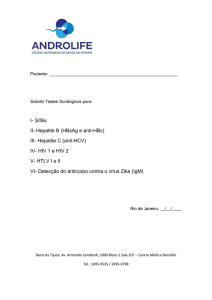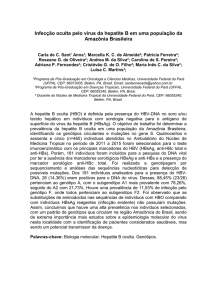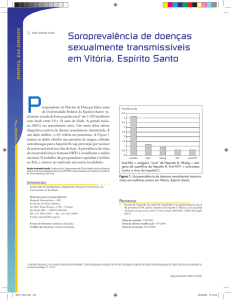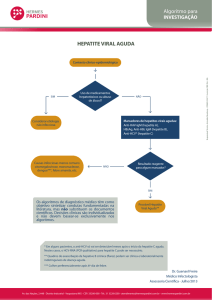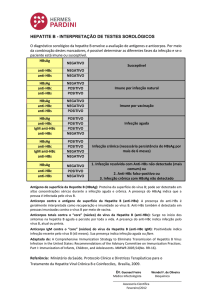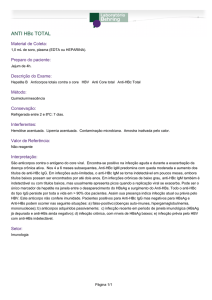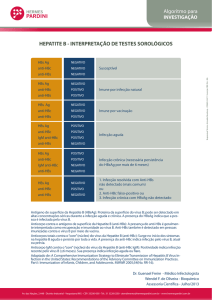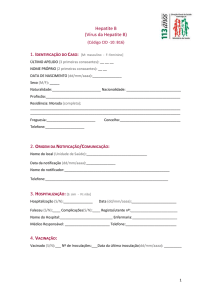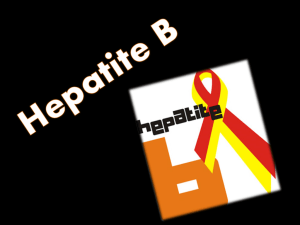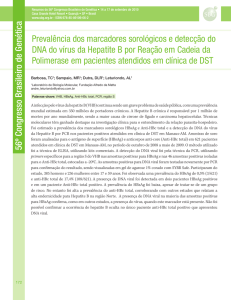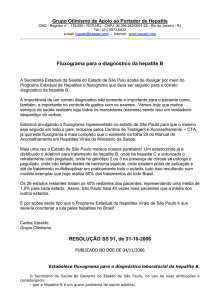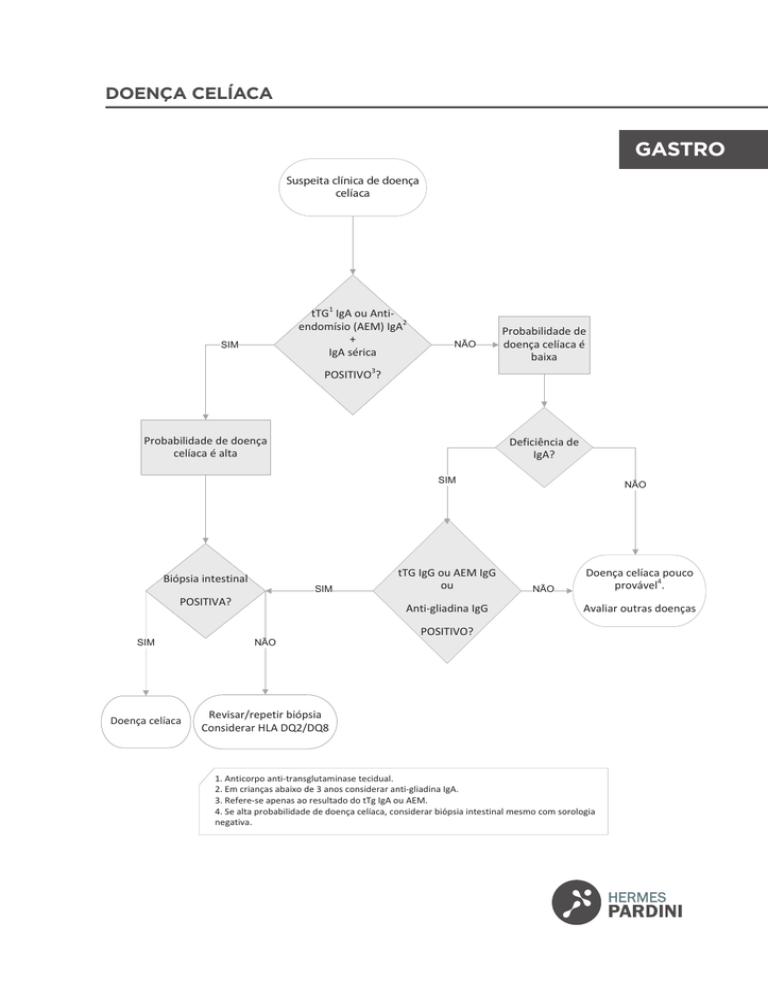
DOENÇA CELÍACA
GASTRO
Suspeita clínica de doença
celíaca
tTG1 IgA ou Antiendomísio (AEM) IgA2
+
IgA sérica
SIM
NÃO
Probabilidade de
doença celíaca é
baixa
POSITIVO3?
Probabilidade de doença
celíaca é alta
Deficiência de
IgA?
SIM
Biópsia intestinal
SIM
POSITIVA?
tTG IgG ou AEM IgG
ou
Anti-gliadina IgG
SIM
NÃO
Doença celíaca
Revisar/repetir biópsia
Considerar HLA DQ2/DQ8
NÃO
NÃO
Doença celíaca pouco
provável4.
Avaliar outras doenças
POSITIVO?
1. Anticorpo anti-transglutaminase tecidual.
2. Em crianças abaixo de 3 anos considerar anti-gliadina IgA.
3. Refere-se apenas ao resultado do tTg IgA ou AEM.
4. Se alta probabilidade de doença celíaca, considerar biópsia intestinal mesmo com sorologia
negativa.
DOENÇA CELÍACA
GASTRO
Parente 1º grau de paciente acometido
Diabetes mellitus tipo 1
Tiroidite autoimune
Síndrome de Down
Síndrome de Turner
Síndrome de Williams
Deficiência de IgA
IgA tTG1,2
SIM
POSITIVO?
NÃO
Considerar HLADQ2/DQ8 ou
tTG IgA periodicamente3
Biópsia intestinal
POSITIVA?
SI
SIM
NÃO
Doença celíaca
Revisar/repetir biópsia
Considerar HLA DQ2/DQ8
Considerar AEM IgA
1 - Anticorpo anti-transglutaminase tecidual.
2 - Se resultado negativo, considerar dosagem de IgA sérica. Se deficiência de IgA, solicitar anticorpos da classe IgG (gliadina,
endomísio ou tTG).
3- Se TTG IgA ou anticorpos da classe IgG negativos, é pouco provável que o indivíduo seja portador de doença celíaca naquele
momento. Entretanto, como demonstrado em testes seriados em pacientes com síndrome de Down ou diabetes mellitus tipo 1,
um resultado inicial negativo não exclui a possibilidade de doença celíaca tardiamente.
HEPATITE VIRAL AGUDA
GASTRO
Contexto clínico-epidemiológico
SIM
Uso de medicamentos
hepatotóxicos ou abuso
de álcool?
Marcadores de hepatites virais
agudas:
Anti-HAV-IgM (hepatite A),
HBsAg, Anti-HBc IgM (hepatite B),
Anti-HCV* (hepatite C)
Considerar etiologia
não infecciosa
Causas infecciosas menos comuns:
citolegalovirose, mononucleose,
dengue , febre amarela, etc.
NÃO
NÃO
Resultado reagente para
algum marcador?
Causas não infecciosas: Doença de Wilson,
hepatite auto-imune, hemocromatose, etc.
SIM
Provável Hepatite
Viral Aguda**
* Em alguns pacientes, o anti-HCV só vai ser detectável meses após o início da hepatite C
aguda. Nestes casos, o HCV-RNA (PCR qualitativo) para hepatite C pode ser necessário.
** Quadros de exacerbação de hepatite B crônica (flares) podem ser clinica e
laboratorialmente indistinguíveis de doença aguda.
Colher preferencialmente após 6º dia de febre
HEPATITE B - INTERPRETAÇÃO DE TESTES SOROLÓGICOS
GASTRO
O diagnóstico sorológico da hepatite B envolve a avaliação de antígenos e anticorpos. Por meio
da combinação destes marcadores, é possível determinar as diferentes fases da infecção e se o
paciente está imune ou susceptível.
HBsAg
NEGATIVO
anti-HBc
anti-HBs
NEGATIVO
NEGATIVO
HBsAg
anti-HBc
anti-HBs
NEGATIVO
POSITIVO
POSITIVO
Imune por infecção natural
HBsAg
anti-HBc
anti-HBs
NEGATIVO
NEGATIVO
POSITIVO
Imune por vacinação
HBsAg
anti-HBc
IgM anti -HBc
anti-HBs
POSITIVO
POSITIVO
POSITIVO
NEGATIVO
HBsAg
anti-HBc
IgM anti-HBc
anti-HBs
POSITIVO
POSITIVO
NEGATIVO
NEGATIVO
HBsAg
NEGATIVO
anti-HBc
anti-HBs
POSITIVO
NEGATIVO
Susceptível
Infecção aguda
Infecção crônica (necessária persistência do HBsAg por
mais de 6 meses)
1. Infecção resolvida com Anti-HBs não detectado (mais
comum) ou
2. Anti-HBc falso-positivo ou
3. Infecção crônica com HBsAg não detectado
Antígeno de superfície da Hepatite B (HBsAg): Proteína da superfície do vírus B; pode ser detectado em
altas concentrações séricas durante a infecção aguda e crônica. A presença do HBsAg indica que a
pessoa é infectada pelo vírus B.
Anticorpo contra o antígeno de superfície da Hepatite B (anti-HBs): A presença do anti-HBs é
geralmente interpretada como recuperação e imunidade ao vírus B. Anti-HBs também é detectado em
pessoas imunizadas contra o vírus B por meio de vacina.
Anticorpos totais contra o “core” (núcleo) do vírus da Hepatite B (anti -HBc): Surge no início dos
sintomas na hepatite B aguda e persiste por toda a vida. A presença do anti-HBc indica infecção pelo
vírus B, atual ou prévia.
Anticorpo IgM contra o “core” (núcleo) do vírus da Hepatite B (anti -HBc IgM): Positividade indica
infecção recente pelo vírus B (≤6 meses). Sua presença indica infecção aguda ou flare.
Adaptado de: A Comprehensive Immunization Strategy to Eliminate Transmission of Hepatitis B Virus
Infection in the United States: Recommendations of the Advisory Committee on Immunization Practices.
Part I: Immunization of Infants, Children, and Adolescents. MMWR 2005;54(No. RR-16).
HEPATITE C AGUDA
GASTRO
Hepatite viral aguda
e/ou exposição ao HCV
Anti-HCV
REAGENTE
Acompanhar pelo
fluxograma de Hepatite
C Crônica
NÃO
REAGENTE
Aguardar 12
semanas
Anti-HCV
e
HCV-PCR Qualitativo
Anti- HCV Não Reagente
HCV PCR Negativo
Anti-HCV Não Reagente
HCV PCR Positivo
Pesquisar outra
etiologia
Considerar
tratamento
Anti-HCV Reagente
HCV PCR Positivo

